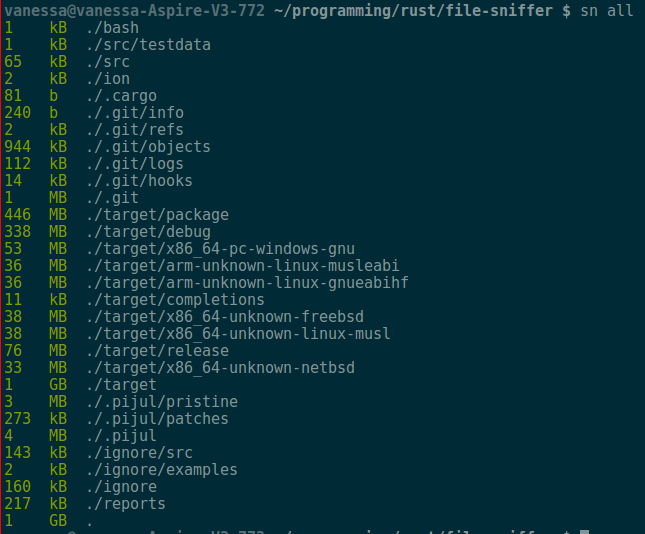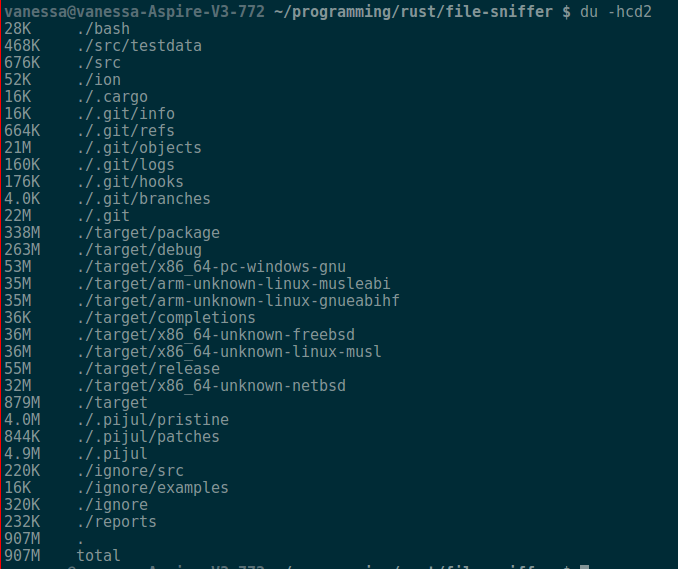The Tin Summer
If you do a significant amount of programming, you'll probably end up with
build artifacts scattered about. sn is a tool to help you find those
artifacts.
sn is also a replacement for du. It has far nicer
output, saner commands and defaults, and it even runs faster on big directories
thanks to multithreading.
Installation
Binary install
The easiest way to install is to download a binary from the releases page.
Cargo
If your platform doesn't have binaries, get cargo. Then:
Make sure you are on nightly; otherwise
Shell completions
After setting BASH_COMPLETIONS_DIR or FISH_COMPLETIONS_DIR, you can install the
bash or fish features like so:
Note that this might need to be run as root, depending on your setup.
Use
To list directory and file sizes for the current directory:
$ sn all -f
To get a list of directory sizes concurrently, excluding version control:
$ sn p --exclude '\.git|\.pijul|_darcs|\.hg'
To get a sorted list of the 12 biggest directories in $DIR:
$ sn sort $DIR -n12
To search current directory for directories with build artifacts:
To look for artifacts or directories containing artifacts that occupy more than 200MB of disk space:
Accessibility
To turn off colorized output:
Comparison (or, 100 Things I Hate About du)
Reasons to use du
- Reads disk usage, not file sizes
- Optionally dereferences symlinks
- Slightly faster on small directories
- Stable and well-supported
Reasons to use sn
- Faster on large directories
- Uses regex for exclusions, making it
dramatically faster than
duwhen used with the--excludeflag. - Defaults to human-readable output
- Colorized output
- Nicer help via clap
- Provides Sorted output
- Finds build artifacts
- Reads file sizes, not disk usage
- Extensible in Rust
- Benefits from upstream improvements in Rust ecosystem
Benchmark results
| Directory | Tool | Command | Time |
| --------- || ---- | ------- | ---- |
| Source | sn | sn p | 60.74 ms |
| Source | sn | sn a | 99.92 ms |
| Source | du | du -hacd2 | 88.28 ms |
| Build | sn | sn p| 185.2 ms |
| Build | sn | sn a | 271.9 ms |
| Build | du | du -hacd2 | 195.5 ms |
| Project | sn | sn p | 36.68 ms |
| Project | sn | sn a | 42.90 ms |
| Project | du | du -hacd2 | 35.53 ms |
These commands are all essentially equivalent in function, except that sn p
may use more threads than sn a or du.
Results were obtained using Gabriel Gonzalez's bench tool. "Source" was my programming directory alone, comprising data, source code, and version control; around 600MB total. "Project" was a single polyglot project, plus artifacts; around 1GB total. "Build" was my programming directory, with current projects built; around 4GB total.
Screenshots (alacritty + solarized dark)
The Tin Summer

du

Heuristic for build artifacts
Currently, sn looks for files that either have an extension associated with
build artifacts, or executable files that are ignored by version control. It also looks for "build
directories", like .stack-work, elm-stuff, etc. and if it finds a
configuration file like tweet-hs.cabal, it considers all their
contents to be build artifacts.
Languages Supported
The following is a list of languages sn artifacts has been tested with.
The intent is to support basically anything, so feel free to open a PR or start an issue.
- Haskell (incl. GHCJS)
- rust
- julia
- python
- Elm
- nim
- Vimscript
- Idris
- FORTRAN
- Ruby
- C